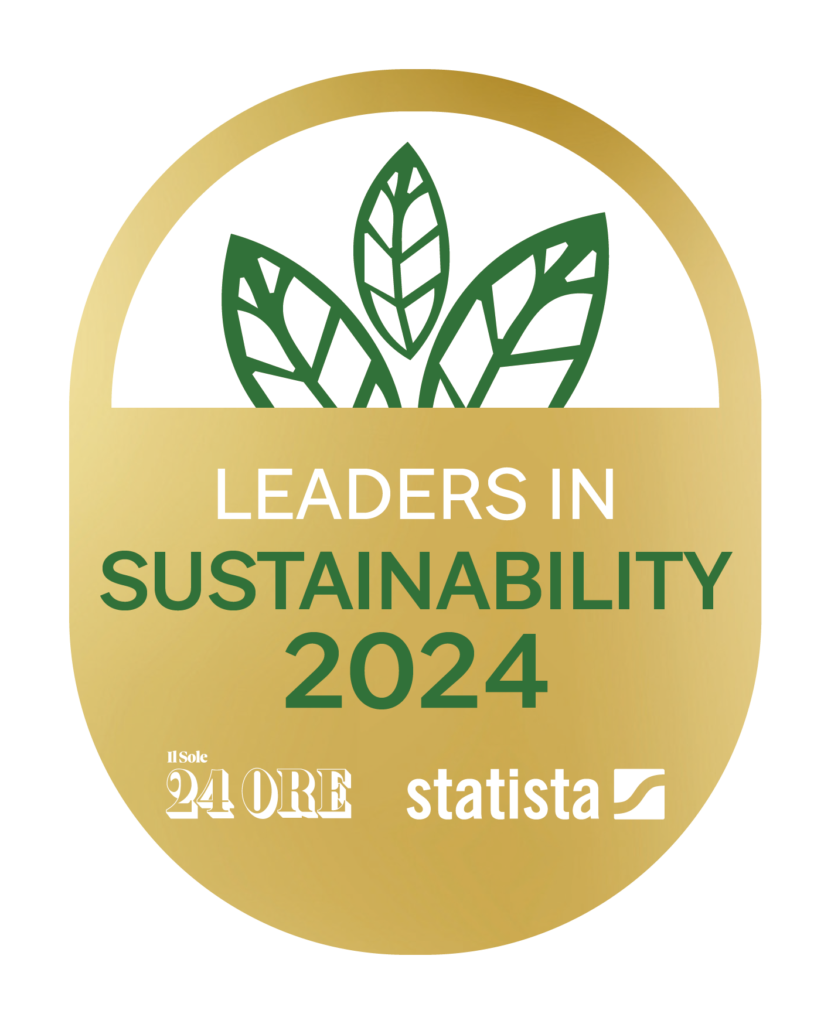02
A sustainable approach
OUR SUSTAINABILITY JOURNEY
“The sustainable path and humanistic capitalism have always guided my journey as an entrepreneur. With our sustainable path, we want to promote a more equitable and harmonious future, respectful of the environment, the planet’s resources, and human dignity, enhancing education and awareness-raising with particular attention to an increase in training. I believe that sustainability is a social pact with future generations. With this path, in our small way, we want to meet the present generation’s needs without compromising future generations’ ability to meet their own needs. Sustainability in our sector is a complex path and it takes much determination and courage to find new solutions.
Talking about ethical gold, as already said on other occasions, is a very dear topic for me. Remember, through GoldLake IP, already in 2008, we were among the first in the world to address these issues and above all to put them into practice with full traceability of gold from extraction to finished jewel. Ethics is a way of acting, a concrete action in everyday reality. I realize that the word ethics is often used inappropriately because it is much easier to say than to put it into practice.
My vision of “human capitalism” with humans at the center, giving them economic and moral dignity. At the same time, I try to promote these practices so that more people become aware of them. We always place the person at the center of our work, guaranteeing the excellence of the services we offer to our customers and suppliers, maintaining particular attention to dialogue with the communities in which we are present, aware that our work’s true value lies in the level of improvement in the quality of life that we can bring to them.”
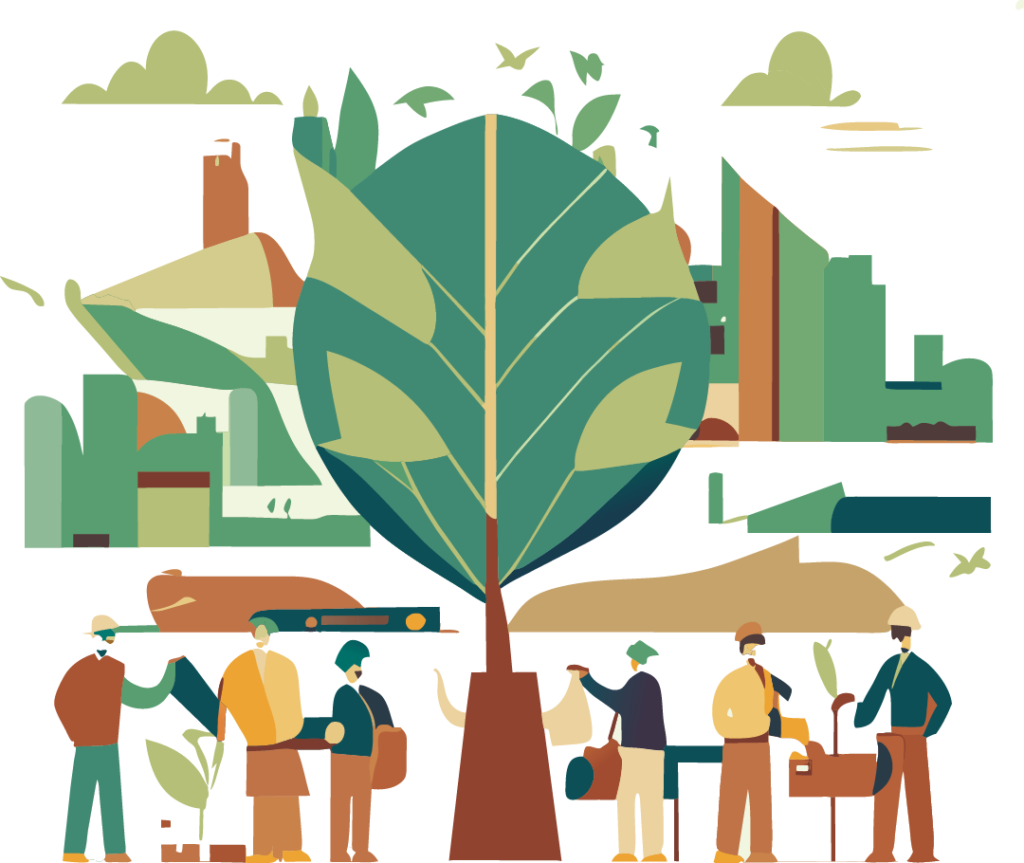
THE PATH TOWARDS SUSTAINABILITY WE HAVE UNDERTAKEN:
Goldlake IP Foundation (Goldlake IP Foundation)
Italpreziosi is aware that the path towards sustainability is a continuous and evolving commitment.
Our contribution to the 2030 Agenda SDGs
The 2030 Agenda for Sustainable Development is an action plan signed by the governments of 193 UN member countries in September 2015. This program includes 17 Sustainable Development Goals (SDGs) and 169 targets. The SDGs are aimed at promoting the well-being of people, the health of the planet and economic prosperity. The official launch of the SDGs took place at the beginning of 2016, with the aim of achieving them by 2030.
Italpreziosi has decided to adopt the 17 Sustainable Development Goals (SDGs) and the related targets as guidelines to follow in every activity the company undertakes. Our standards and policies comply with the United Nations 2030 Agenda. We dialogue and collaborate with our counterparts to share and enhance the standards that we voluntarily adopt, and which can improve the industry’s conduct, making it even more responsible.
Italpreziosi has decided to adopt the 17 Sustainable Development Goals (SDGs) and the related targets as guidelines to follow in every activity the company undertakes. Our standards and policies comply with the United Nations 2030 Agenda. We dialogue and collaborate with our counterparts to share and enhance the standards that we voluntarily adopt, and which can improve the industry’s conduct, making it even more responsible.
Italpreziosi’s work mainly contributes to SDGs
SDG 3 Health and well-being
Sustainable Development Goal 3 focuses on promoting healthy lives and well-being for all people by promoting equitable access to health services, disease prevention and universal health coverage. It is further divided into 13 targets.
Initiatives: Digital Bulletin Board Corporate Welfare Listening desk Health and safety training
SDG 4 Education and training
SDG 5 Gender equality
Sustainable Development Goal 5 commits to achieving gender equality and the empowerment of women and girls, promoting equality of opportunities, access to education and health services, as well as full and equal participation in economic, political and social life.
Initiatives: Diversity and Inclusion Policy Internal and supply chain level training Initiatives supported and panels organized Gender-responsive due diligence
SDG 8 Decent working conditions and economic growth
Sustainable Development Goal number 8 aims to promote decent work and sustainable economic growth, ensuring fair and decent employment opportunities, stimulating innovation and promoting inclusive and sustainable economic growth for all.
Initiatives: Participation at supply chain level to ensure the protection and support of workers and local communities
SDG 16 Peace and justice
Sustainable Development Goal 16 aims to promote peaceful, just and inclusive societies by promoting effective, accountable and inclusive institutions, access to justice for all and respect for human rights and the rule of law.
Initiatives: Support for organizations that promote peace and justice globally
Sustainable Development Goal 17 emphasizes the importance of partnership in achieving the other goals, encouraging collaboration between governments, the private sector and civil society, as well as promoting coherent policies for sustainable development globally.
Initiatives: International memberships for our sector’s sustainable development
MATERIALITY ANALYSIS AND STAKEHOLDER INVOLVEMENT
MATERIALITY ANALYSIS
Materiality analysis identifies the relevant aspects, known as material, for an organization. This analysis was conducted pursuant to the 2021 version of the GRI Standards. The Global Reporting Initiative (GRI) Standards provide a framework for organizations to report their environmental, social and governance (ESG) performance. Companies, governments and other organizations around the world use these standards widely to measure and communicate their sustainability impacts. A topic is considered relevant if it can represent the organization’s impacts on the economy, environment and people, including those regarding human rights (Impact Materiality).
The impact must be considered both at the current level (actual impact) and potential (future impact). Furthermore, the impacts can be positive, if they contribute to the sustainable progress of people, local communities and the environment, or negative if they cause damage to them, as also required by the B Corp™ standard and benefit corporations.
DETERMINATION OF RELEVANT TOPICS
LIST OF RELEVANT TOPICS
| TOPIC | SUB-TOPIC | MATERIAL TOPIC | ||||||||
|---|---|---|---|---|---|---|---|---|---|---|
| Environment |
|
|
||||||||
| Social |
|
|
||||||||
| Governance |
|
|
MATERIAL TOPICS
The materiality matrix observable in the graph below visually is the position of each theme based on two dimensions:
Impact on the organization
Stakeholder interest
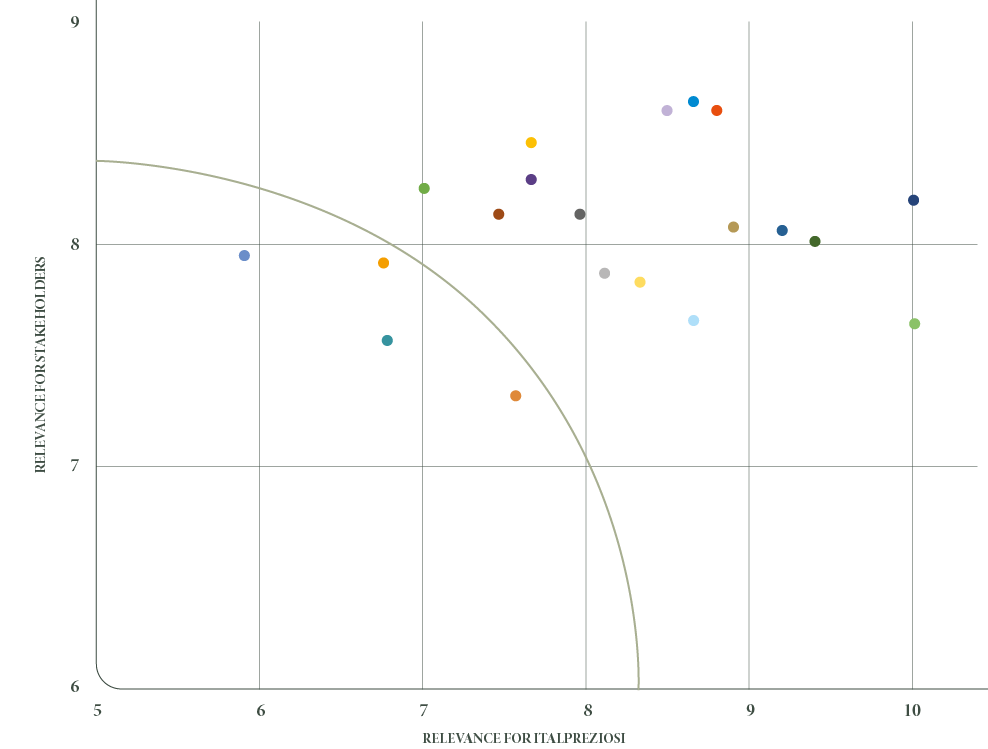
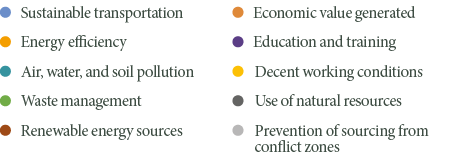
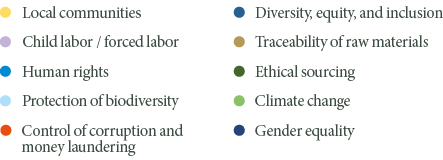
MANAGEMENT OF MATERIAL TOPICS
IMPACT ASSESSMENT AND MANAGEMENT
| MATERIAL TOPIC | IMPACT | TYPE OF IMPACT | DESCRIPTION OF IMPACT, COUNTERMEASURES AND ACTIONS | INVOLVEMENT |
|---|---|---|---|---|
| Climate change | Contribution to climate change caused by greenhouse gas emissions | Negative Actual | Businesses and their supply chains produce carbon dioxide and other greenhouse gases, which contribute to climate change and global warming. Countermeasures: To mitigate our impact, we have certified our carbon footprint, becoming aware of our direct and indirect emissions. This has allowed us to recently embark on a path to set emission reduction targets with SBTi. | Direct Indirect |
| Renewable Energy Sources | Investment and use of renewable energy sources to reduce greenhouse gas emissions and the use of fossil fuelsi | Positive Actual | Adopting renewable energy sources is a key step to reduce impact, especially on climate change. Actions: Italpreziosi is committed to using energy suppliers with an energy mix that increasingly favors renewable energy. It also has its own photovoltaic park. | Direct |
| Energy efficiency | Implementation of technologies and practices to improve energy efficiency and reduce consumption | Positive Actual | Implementing energy efficiency in the workplace and in production machinery allows saving energy and reducing the emissions associated with its production, with consequent benefits for people and the environment. Actions: Italpreziosi has undertaken a constantly updated process of improving efficiency and renewing its technological components. | Direct |
| Biodiversity protection | Protection of animal and plant species and ecosystems in which the operational supply chain activities take place | Negative Potential | Biodiversity has a crucial role in the health and well-being of the ecosystem and consequently of people. The impact on biodiversity can potentially be a significant risk, especially regarding potentially unsustainable extraction processes in the mineral/metal supply chain. Countermeasures: Italpreziosi has become a member of the TNFD (Task force on Nature-related Financial Disclosures). It is committed to requesting information from counterparts regarding compliance with environmental legislation and protection of biodiversity. | Indirect |
| Use of natural resources | Adoption of sustainable practices to preserve and responsibly use natural resources | Negative Potential | The use of natural resources is a risk factor for the environment and the planet, which is amplified when dealing with potential unsustainable extraction practices. Countermeasures: Italpreziosi evaluates the environmental impact of the extraction of raw materials and favors suppliers who adhere to responsible extraction practices, environmental regulations and ethical standards. Furthermore, it promotes sustainable and responsible sourcing practices. | Indirect |
| Waste management | Implementation of responsible waste management practices to reduce the environmental impact of company activities | Negative Potential | Waste management, if conducted incorrectly, can represent a risk for society and the environment. Countermeasures: We monitor our waste production and are committed to applying best practices to reduce its impacts. | Direct Indirect |
| Air, water and soil pollution | Contribution to air, water and soil pollution due to emissions of polluting substances | Negative Potential | Company emissions may contain substances harmful to environmental matrices: water, air and soil. Countermeasures: Italpreziosi regularly monitors its emissions, paying particular attention to the chemical products used, constantly trying to reduce the polluting substances used in production processes. | Direct Indirect |
| Human rights | Protecting and promoting the fundamental rights of people involved in business operations and the supply chain | Negative Potential | Precious metal sourcing presents potential risks such as human rights violations, as, for example, such materials could potentially come from areas of conflict or exploitation. Such violations can also lead to fines, as well as reputational and economic damage. Countermeasures: Italpreziosi adopts rigorous due diligence procedures in line with the highest international standards. | Indirect |
| Child/forced labor | Preventing and eliminating child and forced labor in company activities and among suppliers | Negative Potential | Child and/or forced labor is a human rights violation as well as an unethical practice having a negative impact on people and communities, and on the reputation and economics of the parties involved. Countermeasures: Italpreziosi adopts rigorous due diligence procedures in line with the highest international standards. | Indirect |
| Decent working conditions | Guarantee of safe, healthy working conditions that respect workers’ rights along the supply chain | Negative Potential | If decent working conditions are not respected, there is a negative impact on workers, as well as economic and reputational damage for the parties involved. Countermeasures: Italpreziosi adopts rigorous due diligence procedures and prefers participation in associations and initiatives that aim to guarantee a more sustainable and protected supply chain. | Indirect |
| Diversity Equity Inclusion | Creating an inclusive work environment that values diversity and promotes equity in career and development opportunities | Positive Actual | Diversity, equity and inclusion promote a stimulating work environment, enhance creativity and innovation, and promote company productivity and effectiveness. Actions: To protect these principles, we have drafted the “Diversity & Inclusion Policy.” Furthermore, we promote training on this topic at internal and supply chain level. | Direct Indirect |
| Gender Equality | Promotion of gender equality through hiring policies, professional development and equal pay | Positive Actual | Gender equality in working environments promotes diversity of perspectives, increases employee representativeness, and contributes to a more equitable and inclusive working climate. Promoting these principles along the supply chain also helps raise awareness and potentially increase overall gender equality. Actions: The company has always been committed to female empowerment, as demonstrated by the gender equality certification, as well as by the events organized to promote the topic in the supply chain. | Direct Indirect |
| Education and training | Investment in training and development programs to improve skills and growth opportunities for employees and local communities | Positive Actual | Education and training in the company provides personal and professional development opportunities for employees, increases the team’s skills and capabilities, thus improving the company’s preparedness and competitiveness in the market. Actions: Italpreziosi has always been committed to spreading education and training both internally and along the supply chain, through initiatives, projects and our “Chain of Information” portal. | Direct |
| Local communities | Active involvement and support for local communities to promote socio-economic development and improve the quality of life | Positive Actual | The involvement of local communities can have positive impacts on their well-being, and on the protection of vital natural resources. Actions: Italpreziosi is committed to supporting initiatives to protect local communities, including along the supply chain. | Direct Indirect |
| Ethical Sourcing | Selection of suppliers who respect ethical and social standards in the supply chain | Positive Actual | Ethical sourcing of precious metals ensures that they originate from responsible and sustainable sources, reducing the risk of negative impacts on local communities and the environment. It also promotes transparency and integrity throughout the supply chain, helping to maintain the company’s reputation and credibility. Countermeasures: Ethical sourcing is implemented through continuous monitoring of the supply chain, which has a positive impact on society, local communities and the environment. | Direct Indirect |
| Sourcing from conflict zones | The purchase of conflict zone minerals may be linked to indirect support for armed conflicts | Negative Potential | The precious metals sector can potentially pose a risk of even involuntary involvement in the purchase of minerals from conflict zones, with legal, ethical and reputational consequences. Countermeasures: To avoid such practices, Italpreziosi adopts rigorous due diligence procedures towards counterparts, and adopting standards on responsible practices established by authoritative entities in the sector such as: RJC, LBMA, RMI, OCSE, WGC, ARM. | Direct Indirect |
| Economic value generated and distributed | Creating economic value through company activities, contributing to economic growth, income generation and employment in the communities where the company operates. | Positive Actual | The responsible generation and distribution of economic value promotes sustainable economic growth, contributing to the creation of employment opportunities, the development of local skills and the improvement of the socio-economic well-being of the communities involved. Actions: Italpreziosi is committed to creating sustainable value for shareholders and stakeholders, creating a positive impact on society and the environment. | Direct |
| Raw materials traceability | Traceability of raw materials, to know the path of the metal from its extraction to the finished product | Negative Potential | Lack of traceability of raw materials can lead to working with suppliers who operate in violation of environmental or human rights regulations. Countermeasures: Traceability is part of the company’s core mission and is also guaranteed by the sector certifications obtained. | Direct Indirect |
| Control of corruption and money laundering | Involuntary involvement in illegal activities, such as corruption or money laundering | Negative Potential | Involvement, even involuntary, in such illicit activities can cause legal and reputational consequences. Countermeasures: The company carefully evaluates its counterparts, drawing up a risk index updated regularly and requesting all the necessary information from the counterparts, to have a complete and in-depth picture of their activities, in line with national and international laws and standards. | Indirect |
The four macro-areas are the following:
APPRECIATION OF HUMAN CAPITAL
ENVIRONMENTAL PROTECTION, BIODIVERSITY AND CLIMATE CHANGE
SUPPLY CHAIN, COMMUNITY AND TRANSPARENCY
These macro areas – defined as material – will be examined in each section of this report, following the structure of the BIA (B Impact Assessment).
STAKEHOLDER ENGAGEMENT
Involving our stakeholders is a fundamental and constructive step for Italpreziosi, to understand its current and future performance, but also to seek solutions to all those challenges that our industry is facing.
Our daily work and the creation of long term shared value rely on evaluation of our performances and an updated evaluation of common fundamental topics and dialogue.
We regularly involve our stakeholders, from staff to suppliers, customers, local communities, institutions, associations, industry groups, the press, with the aim of transparently transmitting our values and establishing relationships of trust and promoting development sustainability of our sector.
An anonymous survey was conducted involving all our stakeholders, to identify and implement the common objectives, relevant topics and supply chain impacts and to evaluate our annual performance. The survey parameters are updated annually.
Over the last three years we have seen an increase in the number of responses from our counterparts, especially in the last year.
In 2022 →84 counterparts responded to the survey,
In 2023 →126 counterparts responded to the survey,
The counterparts who responded are: 21% Foreign, 79% Italian
Including:
Main activities involving our stakeholders
SHAREHOLDERS
- Periodic meetings
- Shareholders’ Meeting
- Impact Report
- Annual report
- Chain of information: website dedicated to training on responsible sourcing, due diligence and sustainability
MANAGEMENT
- Monthly meetings with the CEO and department managers
- Due Diligence Commission
- Sustainability Commission
- Supervision and application of the sustainability and business strategy
- Impact Report
- Annual report
- Annual presentation of financial and sustainability statement
CUSTOMERS AND SUPPLIERS
- Corporate communications
- Periodic satisfaction survey and material topics
- Due Diligence On Boarding Process
- Reports and comparisons through industry associations
- Impact Report
- Social Network and website
- Visits to our headquarters
- Visits to our customers and suppliers
- Clear and timely, updated communication
- Collaboration for better sustainability in the supply chain
- Code of Ethics and Supply Chain Policy
- Customer and supplier service
- Chain of information: website dedicated to training on responsible sourcing, due diligence and sustainability
LOCAL COMMUNITIES
- Support local and national initiatives and events in various fields
- Impact Report
- Social Network and website
COMPETITORS
- Meetings organized by industry associations
- Visits and communications
- Collaborations in projects and round tables for the creation of a more sustainable supply chain
- Impact Report
- Chain of information: website dedicated to training on responsible sourcing, due diligence and sustainability
UNIVERSITIES AND INSTITUTES
- Scientific research support with universities
- Support local training courses in the sector
- Meetings of our CEO with local training institutes
- Social Network and website
- Chain of information: website dedicated to training on responsible sourcing, due diligence and sustainability
BOARD OF DIRECTORS
- Periodic meetings
- Impact Report
- Annual report
PERSONNEL
- Internal communication initiatives dedicated to health and safety issues for the management of the COVID-19 emergency, such as newsletters, training sessions
- Periodic Work Climate Survey
- Refresher and training courses
- Coordination meeting among various departments
- Periodic company events for team building and healthy outdoor activities
- Impact Report
- Social Network and website
- Ethical code
- Welfare system
- Digital noticeboard
- Monthly newsletter
- Annual presentation of financial and sustainability statement
NATIONAL AND INTERNATIONAL INSTITUTIONS AND AUTHORITIES
- Meetings with local, national and international political and institutional representatives on sector issues
- Periodic communications
- Constant collaboration
- Visits to our headquarters
- Chain of information: website dedicated to training on responsible sourcing, due diligence and sustainability
VOLUNTARY ORGANIZATIONS AND TRADE ASSOCIATIONS
- Support, membership and participation in LBMA, RJC, RMI, IPMI, UN Global Compact, EITI, WGC, Watch & Jewellery Initiative 2030, IRMA, Fairmined, OECD
- Collaborations and partnerships in multi-stakeholder projects for implementation of sustainability projects
- Participation in round tables on industry topics
- Periodic communications
- Events, conferences, seminars and training initiatives on sustainability topics: creation of guidelines and sharing of best practices
- Continual collaboration
- Visits to the company
- Impact Report
- Chain of information: website dedicated to training on responsible sourcing, due diligence and sustainability
PUBLIC SERVICES
- Collaborations on security
- Environmental impact
- Regular safety drills
- Impact Report
- Periodic communications
PRESS
- Press Relations Office
- Social Network and website
- Impact Report
- Chain of information: website dedicated to training on responsible sourcing, due diligence and sustainability
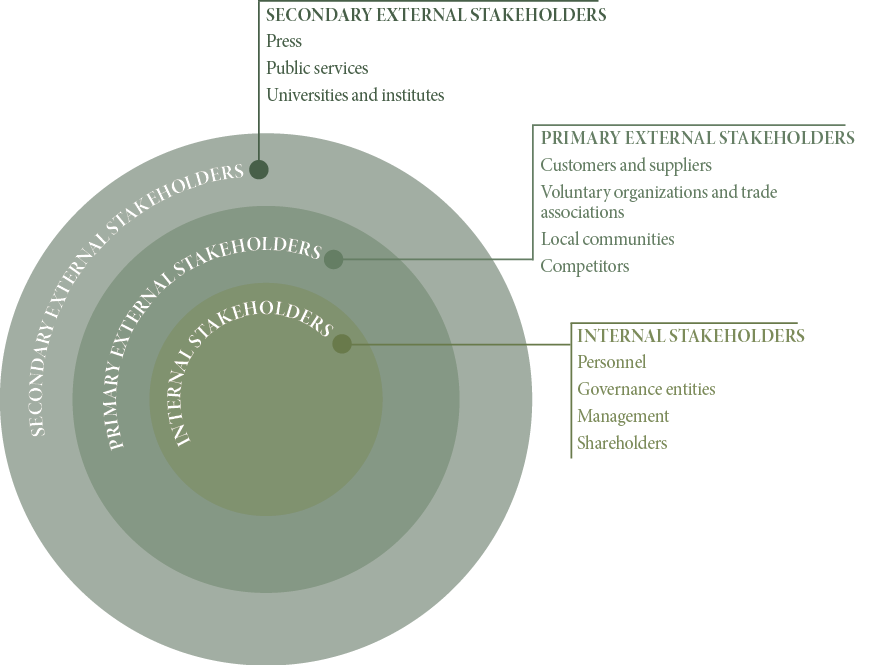
Topics of common relevance
On the following page, we can summarize all topics of primary interest common with our stakeholders. Material issues are always rationalized and updated, considering Italpreziosi’s evolution and the context in which it operates.
For this reason, new parameters were inserted within the macro-areas.
1. Creating value for our stakeholders
2. Protection of the environment in which we live and work
3. Constant appreciation of our people
4. Transparency and sustainability in our supply chain
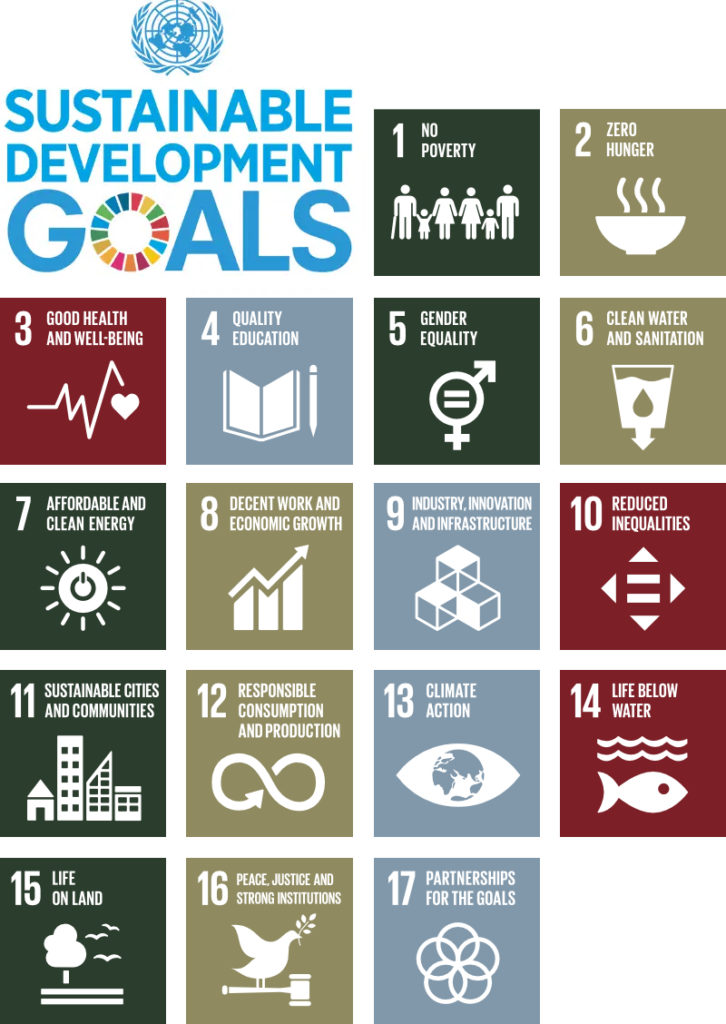
Stakeholders & Italpreziosi
There are specific indicators with regard to important issues, such as gender equality, zero tolerance against discrimination of any kind, sustainable transport. These indicators are highly relevant, confirming these issues’ importance to our stakeholders, aligned with ours.
As indicated in the paragraph dedicated to Materiality Assessment, every year we send and share the anonymous survey to all our stakeholders. Through this, they indicate their recognition of the importance of social, environmental and economic aspects that we have identified.
Compared to the previous year, we have seen a substantial alignment with regard to the importance of issues dear to us and our stakeholders. This is a fundamental aspect because it confirms awareness and centrality on the crucial issue of sustainability in various fields of application, from social to environment. The indicators that saw the greatest increase in relevance for our stakeholders for this year were: the fight against child and forced labor; health and safety; working conditions; corruption control; ethics and integrity.
Sustainability as
a holistic vision
For over 39 years, our mission has been to be our customers’ reference point within the precious metals supply chain, offering excellence, quality, safety, innovation and reliability.
We are inspired by the principles of compliance, ethics, transparency, confidentiali- ty and integrity, adopting the highest international standards and guidelines in management of our activities in all the contexts in which we operate.
We consider sustainability as the engine of a continuous improvement process that guarantees results over time and the strengthening of economic performance and our reputation.
The protection of the environment, protection and promotion of human rights, respect for safe and equitable labor standards, also through technological innovation, represent the founding principles of our way of operating, in line with the United Nations 2030 Agenda.
The United Nations 2030 Agenda for Sustainable Development was presented in 2015. It represents an important awareness among the entire international community, which has finally committed itself to collaborating and working every day to achieve the 17 common goals.
This is why we support the initiative, in line with our company’s values in a holistic vision of sustainability, where every single objective must be considered.
The objectives are the basis of the new 2020-2025 Business Plan, which will accompany Italpreziosi on a path to excellence thanks to its Sustainable Business Model, based on four pillars.
“Italpreziosi is a totally innovative company from a technological point of view, which focuses on humans, their dignity, continuous improvement and well-being, capable of integrating economic value with human value, attentive and motivated by ethical principles with great attention and respect for the environment, with emissions close to 0, respect for the planet’s resources, to help leave
it in good condition for the next generations, investing and valuing the surrounding territory with social and cultural events”
Ivana Ciabatti
CEO of Italpreziosi
Materiality assessment
At Italpreziosi, we are aware of the centrality of all 17 Sustainable Development Goals (SDGs). Therefore, we consider it necessary to address them holistically and not individually. Each objective influences the other, and it is therefore necessary, within the limits set by our scope of action, to include the 17 objectives in all of our activities.
The Materiality Assessment process is central to drafting the Sustainability Report. The methodological process integrated the following steps:
Identification
Significant topics are identified by conducting an analysis of the context of activity and our Business Plan.
Prioritization
The primary topics were identified that will have a fundamental impact both within and outside of business activities. In doing so, our stakeholders’ involvement and the in clusion of their visions in ours is essential.
Validation
All topics and aspects identified and prioritized in compliance with the principle of “completeness.”
Report
Review
All these values, in addition to having been fundamental in drafting the Report, were the crucial themes for developing the 2020-2025 Business Plan.
Stakeholder involvement
Involving our stakeholders represents a fundamental and constructive step for Italpreziosi to understand its current and future performance, but also to seek solutions for all those challenges that our industry is facing. The evaluation of our performance, with an updated assessment of common fundamental issues and dialogue, are the basis of our daily work and the creation of shared value in the long term. We regularly involve our stakeholders, from staff to suppliers, customers, local communities, institutions, associations, industry groups, the press, with the aim of transparently transmitting our values and establishing relationships of trust and promoting the sustainable development of our sector.
An anonymous survey was conducted involving all our stakeholders to identify and implement common objectives. The survey parameters are updated every year.
82 colleagues responded to the survey, 84 in 2023

